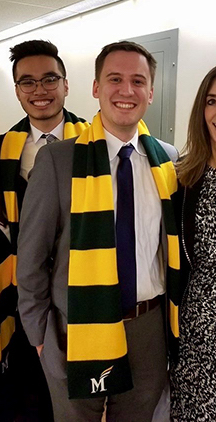“There’s a lot of really great ways that you can use technology to engage with the world and change things […].”
— Tim O’Shea, Government & International Politics Honors College alumnus
The average American tends to have more knowledge about how they are represented in the federal government than about their representation at the state level. While there are numerous reasons why this is the case, a group of George Mason students and alumni are working to close this informational gap through technology.
Democracy onAir, an online hub started by entrepreneur Scott Joy and now run by students, hopes to be the answer to all the questions people, particularly young adults, may have about who is representing them at the state-level.

Executive Director of OnAir and Mason alumnus Tim O’Shea. Photo by Lathan Nathaniel Goumas/George Mason University Strategic Communications
“Our objective is to use technology in a way that makes it easier for people to engage in more civil [and educated] democratic processes,” said Tim O’Shea, an Honors College alumnus who graduated from Mason last May. O’Shea studied Government & International Politics as an undergraduate and is currently a Juris Doctorate candidate at Georgetown University.
On October 25, O’Shea and current Honors College senior Adia McLaughlin hosted a colloquium introducing onAir to a group of first-year Honors College students. Both O’Shea and McLaughlin joined onAir when it was just a startup and have continued to contribute to the interactive information hub. O’Shea is now the Executive Director of onAir while McLaughlin serves as the Content Director.
O’Shea and McLaughlin’s colloquium encouraged students to evaluate how they can be civically engaged on and off campus while informing them of the resources provided by onAir.
“Our hub is completely curated and managed by students,” emphasized McLaughlin, who is double majoring in Communication and Government & International Politics. Students involved with onAir interview representatives, host town hall meetings, and keep the hub’s pages up to date with current politics.
“We want to democratize the production of political information [in order to engage] young people in the process of creating that information,” explained O’Shea. O’Shea believes that “political information is better” when it is “produced and curated by people who actually live in communities that are impacted by [policies].”
The Virginia onAir hub allows users to enter their residential address and easily identify who is representing them at all levels. Users can then click on a representative’s name and read a complete background on that politician’s affiliations, election results, voting records, positions on major issues, and much more.
Students working for onAir use a stock set of questions when interviewing representatives to create an even baseline with which users can evaluate politicians.
“The goal of our hub is to provide that same quality and availability of information that a lot of us have for our federal representatives, but on the state level,” said O’Shea.
“All [policy] affects us. […] That’s really the basis of onAir.”
— Adia McLaughlin, Honors College senior; Communication and Government and International Politics double major; Student Government Vice President
Honors College senior and Chapter Director of Mason's OnAir, Adia McLaughlin, explains her relationship with OnAir. Photo by Joshua McLean.
Currently, Virginia is the first state to have a Democracy onAir hub, and Mason is the first onAir university chapter. McLaughlin is the president of Mason’s onAir group, which connects with more than 20 representatives. However, McLaughlin has a different relationship to the organization than some others.
“I’m from North Carolina, and I vote in North Carolina,” explained McLaughlin. “But by becoming closer to Fairfax representatives, […] I’ve been able to advocate for my fellow GMU students who do have stakes specifically here.”
Democracy onAir intends to spread to more regions of Virginia by reaching out to students at universities across the state in hopes of creating new onAir chapters. The organization also hopes to expand to more states in the future.
“The reason Mason was such a great pick to start is because we have so much civic engagement already on this campus,” said McLaughlin. “It wasn’t hard to find students who were willing to put in the time [and effort] to collect all of this data.”
At the end of the colloquium, O’Shea and McLaughlin encouraged all the students to leave their mark at Mason by creating their own unique paths to achieve their goals. The two hope that onAir shows students that there are always innovative and more effective ways to accomplish something than what may be traditional.
“There’s a lot of really great ways that you can use technology to engage with the world and change things, and we hope we’re an example of that for people,” said O’Shea of his and McLaughlin’s contributions to onAir.
“All [policy] affects us,” said McLaughlin. “That’s really the basis of onAir.”
To explore the Virginia onAir hub, visit va.onair.cc. To explore GMU’s onAir chapter, visit va.onair.cc/category/chapters/gmu-onair-chapter/.
